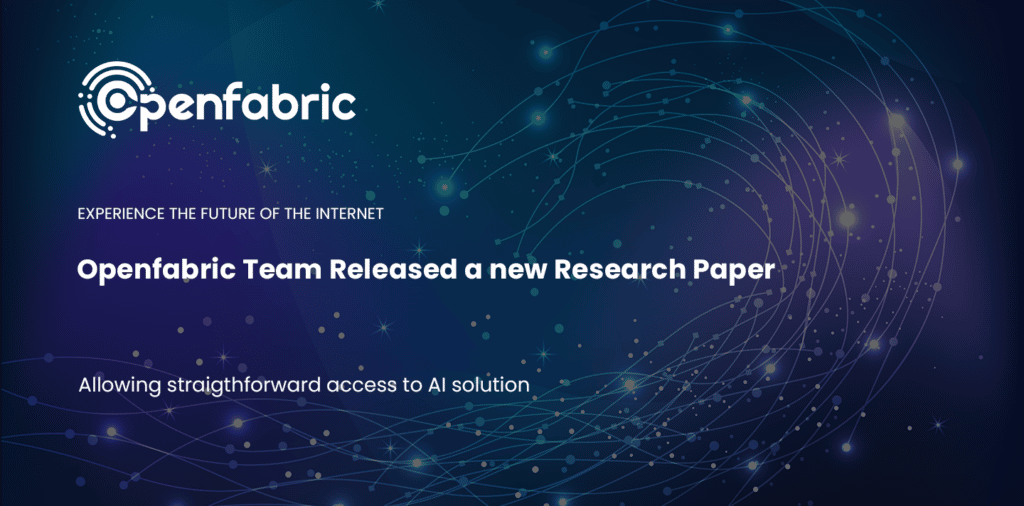
May 12, 2022 4 minutes read
Openfabric Team Released a new Research Paper

The recently published research paper titled ‘Performance Analysis of an Ontology Model Enabling Interoperability of Artificial Intelligence Agents’, will be available in the Springer Series: Lecture Notes in Networks and Systems – ISSN 2367-3370.
The work is a useful addition to the domain of decentralized AI, distributed ontologies, and blockchain. It brings forward new and insightful research in these domains by exploring innovative solutions to some of the pressing concerns that arise with the implementation of real-world problems in the domain. It is a significant and vital continuation of the series of papers published by the team at Openfabric.
About the paper
With the information systems of today, we have seen that in order to process large amounts of information, semantic models are being used. These models are based on extremely light and scalable structures. Coupling them with Artificial Intelligence (AI) in multi-agent, cross-organizational systems brings forward new and exciting opportunities. The team at Openfabric has published this paper in order to showcase the feasibility of how ontology-based semantic data models can be used as communication interfaces among multiple AI agents. The paper also focuses on the storage, retrieval, and replication part of this process in a decentralized medium.The paper takes us through the background and brief history of AI technology and how it synergizes with blockchain and DLT (distributed ledger technology) in the current era to enable us to build exciting new applications that have an immense impact on the future. These technologies can be effectively used to solve some of the key concerns of our world.
The team behind the publication
This research paper is the result of the hard work and dedication of core team members Andrei Tara and Nicolae Taban, along with the technical advisor of the team, Hjalmar Turesson.
Andrei Tara is the founder and CEO of Openfabric. He is a seasoned entrepreneur, polymath, and researcher having a strong focus on new paradigms capable of improving the human condition through emergent technologies such as Artificial Intelligence, Blockchain, and Quantum computing. He served as the core developer for Elrond Network and as a Blockchain Research Fellow at Insolar. Andrei holds a BS in Computer Science, an MS in Advanced Computer Systems, and is doing his Ph.D. research on Blockchain Architectures.
Nicolae Taban is an expert Research Engineer at Openfabric. His area of expertise is CPU Hardware Optimization. He has done his BS in Computer Science along with an MSc in Computer Science from the Lucian Blaga University of Sibiu.
Hjalmar Turesson is a Deloitte Data Scientist at Schulich School of Business, currently working on Natural Language Processing. Throughout his career, he has straddled the line between natural and artificial intelligence. His Ph.D. research is on how language – a compositional system – arises from the combined computations and communication of millions of simple interconnected units: the neurons of our brains. As a researcher, he has built experimental systems and analyzed large physiological and behavioral datasets. His current focus is on artificial neural networks, NLP, and applying large language models to automate tasks that just a few years ago required manual labor. Hjalmar holds a Ph.D. in Neuroscience and Psychology from Princeton University, an M.Sc. in Behavioral and Neural Sciences, and a B.Sc. in Biology.
Significance of this research
The paper is a significant contribution to the current technological landscape as it addresses some of the key concerns that present-day data processing systems face. With the abundance of information and huge datasets available, processing that information into meaningful insights is a monumental task that can not be addressed by the traditional approaches. Lightweight, semantic data models pave the way for multiple cooperative intelligent agents to collaborate and solve such tasks. This is achieved by breaking down monolithic data and encapsulating it into flexible data formats that can be transmitted between intelligent agents in a decentralized environment. The research not only delves into a novel agent interaction model that creates an environment enabling multiple agents to cooperate, but it also evaluates the performance of decentralized technologies like IPFS, Tendermint, and Hyperledger Fabric. Even though this is a vast area of study, the paper succeeds in laying down the vital groundwork that will foster more research and development in the area.
Learn more about Openfabric
OpenFabric is a platform for building and connecting AI applications. It is an ecosystem where everyone has access to quick, easy, and low-cost artificial intelligence (AI) technology.Openfabric addresses some of the most challenging problems faced by AI platforms of today. It lowers the infrastructure demand and technical know-how required to utilize AI-Apps and facilitates new market opportunities. It also successfully enables fair market competition as an essential factor in creating large, vibrant, and collaborative communities.
Openfabric is revolutionary in the AI space as it leverages blockchain technologies to ensure execution scalability and eliminates vendor lockup. It is not just a platform for developers or techies but the beauty of the system is that it brings the power of AI to the hands of anyone who desires to use it.
At Openfabric, we believe that AI can be used to create the next generation of technological advancements and to unlock the exponential value contained within them. To become a part of the movement, you can simply visit our Website and follow us on our social media (Twitter, Telegram, Linkedin, and Facebook) to get the latest information and news regarding the platform.

